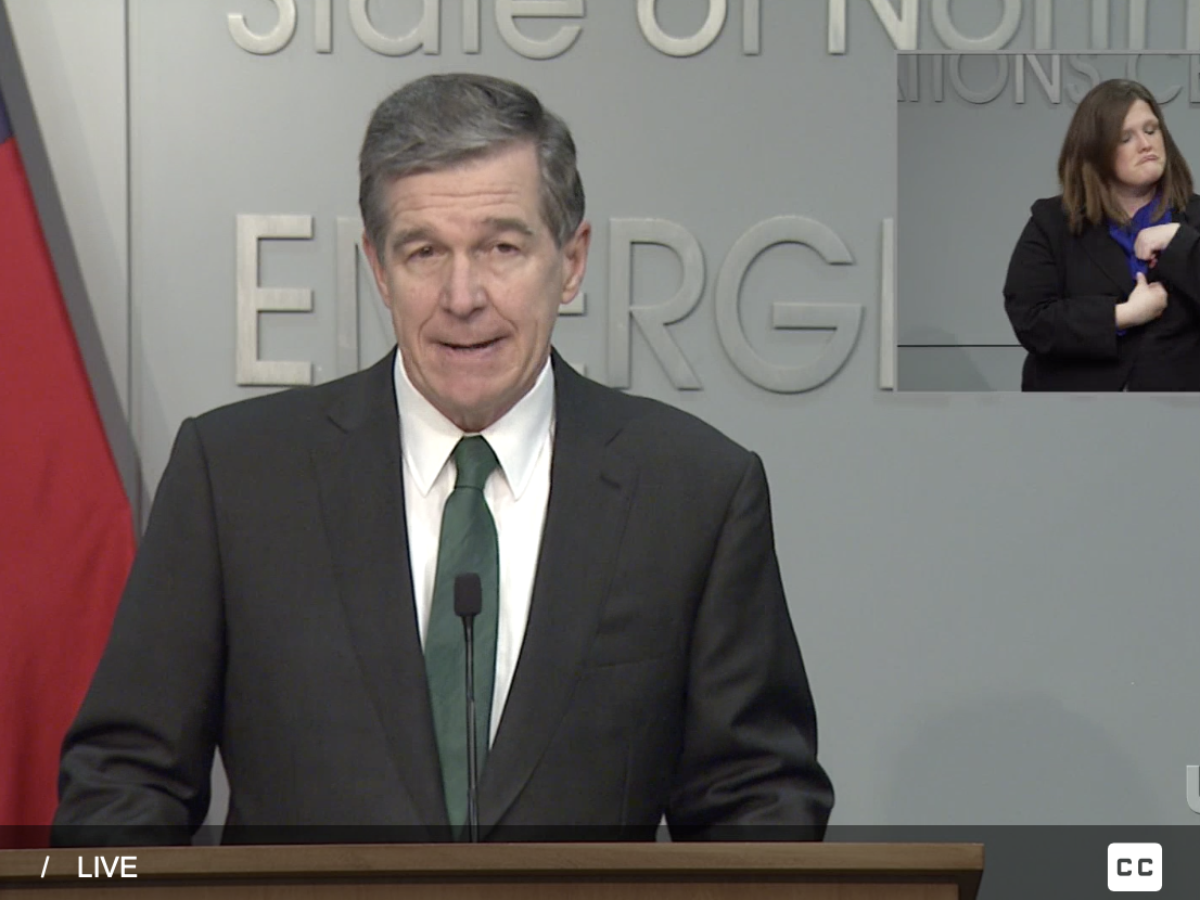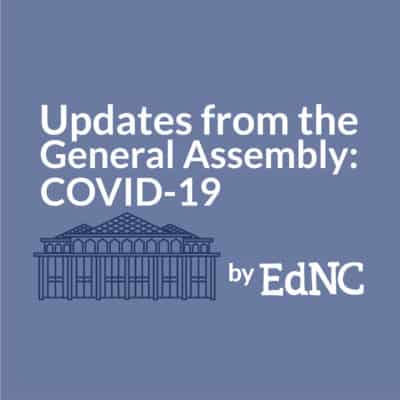

During a press conference on Aug. 26, Democratic Gov. Roy Cooper presented his 2020-21 budget, which includes bonuses for teachers and principals and additional COVID-19 relief funds for K-12 schools and others.
Cooper wants to spend $132 million in COVID-19 relief funding to help the state’s public schools purchase personal protective equipment and cleaning supplies; transport meals, instructional materials, and digital devices; increase access to the internet; and more. He also wants to spend $30 million in relief funds for the community college system for coronavirus testing, quarantine spaces, part-time faculty to reduce class size, and more.
The governor is also proposing spending $230 million in state dollars to provide a one-time, $2,000 bonus to teachers and principals.
“The budget I propose takes on the challenges of today while building for the promise of tomorrow,” Cooper said during his press conference, adding: “We have to rise to the occasion of this pandemic response now.”
The governor’s budget plan comes ahead of lawmakers’ return to Raleigh on Sept. 2 for what is expected to be a two-day session. Legislators are expected to take up a number of issues, including COVID-19 impacts.
Lawmakers had about $3.5 billion in federal COVID-19 relief to spend this summer. They put a large dent in the funds but still have between $552 million and $903 million funds left, according to a presentation made during a House committee Tuesday. The margin is because the state has plans for about $351 million that they can’t move forward with unless the federal government loosens restrictions on how the relief funds can be spent. Instead of waiting for that change, lawmakers could instead spend that money within the current parameters set by the federal government. The governor’s budget proposal would do so.
On Aug. 25, state education leaders in K-12 and higher education presented to a House committee about their COVID-19 related needs. In just the K-12 sphere, leaders are asking for $120 million in new spending.
When it comes to non-relief state money, Cooper wants to spend $50 million “as part of the state’s commitment to provide a sound basic education for all students.”
The quoted line is a reference to the Leandro case, a long-running theme in North Carolina education since 1994 when families from five low-wealth counties sued the state, claiming North Carolina was not providing their kids with the same educational opportunities as students in higher-income districts. The State Supreme Court ultimately said that the state’s children have a fundamental right to the “opportunity to receive a sound basic education” and that North Carolina had not lived up to that constitutional requirement.
Both sides in the Leandro case agreed back in 2017 that an independent consultant should be chosen to make recommendations on how the state can ensure a quality education for every North Carolina child.
That consultant was WestEd, and the organization released a report in late 2019 that laid out how the state can ensure that all students in North Carolina have the opportunity for a “sound basic education.”
A consent order followed, signed by the judge in the case, and the next step was for the parties to deliver a report that laid out how to meet the short-term goals of the West-Ed report. That report dropped in June.
The $50 million proposed by the governor would “serve the highest needs students, schools, and school districts,” and would include expanded funding for children with disabilities, at-risk students, and English language learners. It would also expand the North Carolina Teaching Fellows program and the College Advising Corps.
Among that $50 million is $12.3 million to increase “NC Pre-K rates to more closely reflect true costs” and to increase “funding to Smart Start to support children from birth to age five and their families.”
In addition to the $230 million in bonuses for teachers and principals, the governor is proposing spending another $50 million to provide a one-time, $1,000 bonus to non-certified public school personnel. And $80 million would pay for a one-time, $1,500 bonus to UNC System and NC Community College employees.
Because Cooper vetoed the long session budget in 2019, teachers in North Carolina didn’t end up getting a raise in 2019-20 or 2020-21. In the short session this summer, lawmakers did provide money for a $350 bonus for teachers in addition to their expected step increases.
“Notice that these aren’t raises,” Cooper said of his bonus proposal. “They are not recurring raises. Because we don’t know what the budget forecast is going to be.”
To pay for some of his state-funded proposals, the governor’s plan would take $85 million from the state’s funding for opportunity scholarships. These are dollars that are granted to low-income families so that students can go to private schools. According to the governor’s budget, enough money would remain that all students already getting opportunity scholarships would still get them.
In a press release, Sen. Deanna Ballard, R-Watauga, said the governor’s budget “strips low-income children, many of whom are Black, from the chance to choose the education that best suits their needs. Under the Governor’s ‘equity’ plan, only the wealthy can attend private school.”
But even before Cooper came out with his proposal, Senate Republicans were already criticizing him. On Aug. 21, a press release went out from Senate Republicans announcing that Senate budget writers had finalized “plans on proposals” for the session starting next week. The release said the session was expected to last two days and that items taken up would include education, health care, and rural broadband.
In addition, the release criticized Cooper for not submitting a formal budget for the short session to legislators this year, noting that the fiscal year started on July 1.
Senate budget chairs Harry Brown, R-Onslow, Kathy Harrington, R-Gaston, and Brent Jackson, R-Sampson, issued the following joint statement on the matter in the release.
“Proposing budgets when the state is flush is easy, but making tough calls during a recession is what demands real leadership. Gov. Cooper hasn’t bothered with a budget proposal this year, and we’re moving ahead with final plans on what to propose to the full legislature. A budget proposal from the Governor the week before we come into session is pointless.”
However, Cooper said during his press conference that his budget was targeted and that if Republicans wanted to take a few extra days to consider and work through it, they could.
“This is streamlined budget,” he said. “Much smaller than any kind of regular budget. I think you could condense it down to about 50 lines.”
State budget director Charles Perusse said during the press conference that the governor didn’t release a budget until now because his administration was waiting for another round of anticipated stimulus spending from the federal government (which hasn’t come). That, combined with revenues from the July 15 tax date and the fact that lawmakers were coming back in September, indicated “now was the time to present the governor’s budget based on what we know to be fact at this point in time,” Perusse said.
Revenue that came in from that July 15 tax date has also now become a source of contention.
In another press release put out before Cooper released his budget plan, Senate Republicans announced an unexpected budget boon thanks to tax collections, then warned against using it.
The release said that the state’s “nonpartisan fiscal experts” told lawmakers that the state over-collected about $457 million in taxes. The release stressed, however, that this is a one-time event and happened, in part, because the state’s experts thought more people were going to pay taxes after April 15 when the tax deadline was extended. Basically, the release is saying that money was collected last year that the experts thought would be collected this year. That means the state may have more money in revenue now, but that could mean less money in revenue next year, according to the release.
Brown then warned Cooper and Democrats against using that money. But in his plan, Cooper did anyway, and in a press release on Aug. 26, Senate Republicans criticized him for it.
“Gov. Cooper’s four-months-late budget proposal spends every single penny of the $457 million despite clear warnings from the state’s nonpartisan fiscal experts,” the release stated.
The governor’s proposal also includes a $4.3 billion education, housing, and water/sewer bond. The bond would go before North Carolina voters for their approval.
The governor’s budget would also hold school districts and principals financially harmless from changes to Average Daily Membership (ADM). Some districts are concerned that differences between their projected Average Daily Membership and actual Average Daily Membership will mean reductions in budgets this school year.
Schools get state funds based on projected ADM, but their budgets can be adjusted if actual ADM is different. Additionally, principals are paid, in part, based on the number of students in their school. So, changes in the Average Daily Membership can affect their salaries. Average Daily Membership is essentially a way to measure the number of students who go to a districts’ schools.


